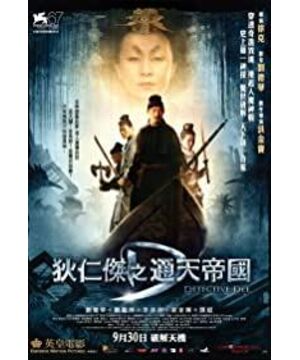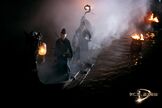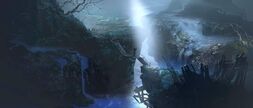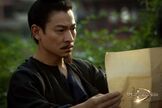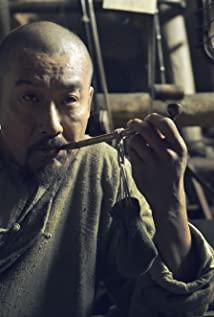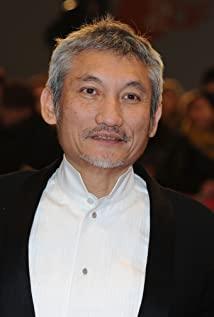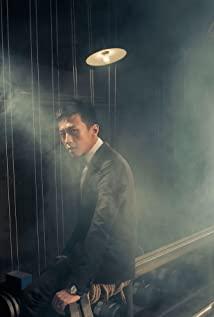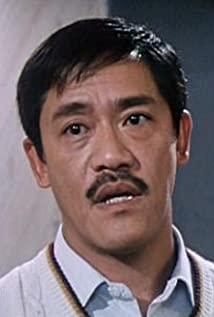Tsui imagination Times article
from one perspective, [Di Renjie] is about a story of the Tang Dynasty, Tang Dynasty minister of state and who is related to a famous female emperor. The era under Wu Zetian's control was special for both the Tang Dynasty and the entire Chinese history. What we care about is how this special will look like after being processed by Tsui Hark.
The master mentioned in an interview, "I have a humorous attitude towards Chinese history. I really don't know what the real history is like. I read different books and found that there are big differences." Since there are differences. It already exists, and it's okay to make a fuss. For example, the background was clearly set in the [Xinlongmen Inn] in the Ming Dynasty. When Lin Qingxia, a men's wearer, heard the self-registration number of gold inlaid jade, she casually said "The jade is sighed in the box, and the gold hairpin is buried in the soil", which obviously uses "A Dream of Red Mansions". "The jade belt hangs in the forest, the golden hairpin is buried in the snow", not only sighs that the young woman has the courage to face the desert wind and sand, but also speaks for her own destiny, crossing just right. [Green Snake] is a Song dynasty story, but Wang Zuxian and Maggie Cheung used Cantonese opera and Peking opera "forehead makeup", jumping out of the times, but immersed in the scenery. On Xuxian Academy, the most romantic male student named "Qin Zhong" is also a kind of love in "A Dream of Red Mansions". Not to mention the epoch-making meeting between Huang Feihong and Sun Yat-sen. In [Di Renjie], there is also the prison of burning characters that was originally built in the Song Dynasty and was passed through to the Tang Dynasty to appear, just to fit the film's suspenseful atmosphere. For Tsui Hark, when the artistic conception and the meaning are right, they are both right, not sticking to the so-called historical facts, only loyal to the spirit of the times. Responding to Liu Damu, who has cooperated many times, said: "Others collect information to verify historical details, and Xu Hark collects information to stimulate imagination."
Tsui Hark’s imagination of each era is based on finding what is of interest, then zooming in, and then deconstructing it from a modern perspective. [New Dragon Inn] Make a fuss about the Dongchang eunuch. The Ming Dynasty controlled by the eunuch seems to be walking on a blue blade. The keywords are intrigue, concealing a knife in a smile, transvestite, and conspiracy theory. I always want you to come and go before you start. Great performance; [Swordsman] was also set in the Ming Dynasty, but it was made up by Xu Hark after studying the Sun Moon God Religion-Jin Yong’s original works were actually not dynasty, and the imperial presence in Wanli years was rather meager, and Xu Har did it again. The main line of the story of Xu Fu Xun Dan is different from the whistling atmosphere of Jing Tai Nian. For him, "It is good for Yue Buqun, whether it is my own way, or the undefeated East, these characters They are laying the foundation for our confusion and confusion about this era, and there is a kind of relief in it." In the two endings, Ling Hu Chong and Zhou Huaian, both by coincidence, wandered the world on a single horse, revealing that the Ming Dynasty carried a large part of Xu Ke’s escape from the world. Concept. Perhaps the most interesting dynasty in Tsui Hark's mind is the Jin Dynasty. Although [Liang Zhu] is a great tragedy, because Tsui Hark desperately magnified the elements of men's popular makeup at the time, the whole film was intertwined with laughter and tears, and it was also quite realistic and allegorical. It would be better to put the matter of "storing the principles of nature and seeking the desires of others" in the Song Dynasty, which emphasizes Neo-Confucianism and education, but has left the world with the most exquisite minor tunes. Xu Xian and Fahai, one is a rigid teacher, the other is abstinence The cultivators were deceived by the white snake and the green snake respectively. On the dancing pavilion stage, there was a romantic atmosphere that could not be beaten by the wind and rain. Tsui Hark's use of humans, Buddhas, and monsters [green snake] provoked the entire Song Dynasty.
The Tang Dynasty has always been an extremely magnificent node in Chinese history. The first stage that Tsui Hark laid out for it was actually "Journey to the West". Unfortunately, the plan was repeatedly shelved. Fortunately, with [迪仁杰], Tsui Hark had a great influence on the Tang Dynasty. Confess. Xu Ke’s first concept for the Tang Dynasty was an “international metropolis”, where students from Chang'an and Luoyang gathered together, and the Chinese, foreign, and Hu cultures were fully integrated. Whether it was literature, politics or the relationship between men and women, people were unprecedentedly open. Attitude, but the subsequent Song Dynasty seemed to cut off this openness. This "last conceptual prosperity" was of interest to Tsui Hark. During Wu Zetian's reign, there is no doubt that for the entire Chinese history, it was a peak of open-mindedness. On the other hand, religious meaning is also a key. Wu Zetian respected himself as a god and Buddha, and made a statue of himself. The magnificent Buddha statue created a strong Buddhist atmosphere for the film, but the dignity of the treasure is tortured and killed, which is reminiscent of [青蛇] accompanying the enchanting dance. The Sanskrit "Mohuluojia", Yan Chixia, a Taoist priest, recites the Buddhist Prajna Paramita's Heart Sutra to catch demons. Tsui Hark always likes to use the Buddhist concept of "emptiness" to mirror this world of desire, and this time he got an excellent summary in [Di Renjie]. In the Tang Dynasty, materially extravagant, but spiritually, they deliberately pursued the desireless Buddhism. This extreme contrast carries a great irony. The huge statues are also satirizing Wu Zetian's huge desires.
In the final analysis, all times that can inspire Tsui Hark's imagination are basically "turbulent times." [New Shushan Swordsman] Involving five chaotic Hua, plus the historical characteristics of "the world has not been in chaos before Shu, the world has ruled Shu but has not been ruled", [Xinlongmen Inn] opens with a narration, "During the Jingtai period of the Ming Dynasty, the eunuch had the power... …", the [Huang Feihong] series is from the late Qing Dynasty and the early Republic of China, where Chinese and foreigners lived together, and the impact was strong; [Dao Ma Dan] was a warlord separatist after the Revolution of 1911 and panic. In Tsui Hark’s troubled times, officials and people are often in the same situation, and good and evil are clearly distinguished. Just like the beginning of [Knife], the monk who saw injustice in the market was beaten to death by the evil forces in a flash, and the justice had to confess his life; [倩女] Ghost] At the beginning, Ning Caichen also encountered a group of vicious "public servants" while walking down the street, and the grass people evaded him for fear. The opposition between the imperial court and the people further drew back the aspirational helplessness of the sons and daughters of the rivers and lakes in the lonely smoke of the desert, and also reflected the feelings of Xu Ke's family and country.
In contrast, [Di Renjie] chose the troubled times of the Tang Dynasty, but the focus was not on the common people, but on the court itself, which Tsui Hark had always "demonized". Di Renjie became the rare positive official in Tsui Hark's hands and will always be " "If you live far away, you will worry about your monarch." The perspective turns to "If you live high in the temple, you will worry about your people." Indeed, even in the context of the entire history, the hot name "Tang Dynasty" is indeed the most suitable for people to enter the world. It is not more cautious and cold than Song and Ming. The Tang Dynasty points to a rich color and open-mindedness. His posture has all the imagination of openness and tolerance. Can we say that Tsui Hark, who has always supported the retreat of knights, can also regain his confidence in the world because of the word "Tang Dynasty"? After all, in Tsui Hark's mind, regardless of generations, regardless of gods and ghosts, all the world is truly muddy.
Yuyu Jiacheng, there
is a scene from Xu's imagination with blue blood . It is
too illusory.
Since the beginning of the expedition, the many real scenes built by [Di Renjie] in Hengdian have made our reporters heartbroken. There are winding caves in the ghost market, which are reminiscent of [蝶变] In the underground world of Shenjiabao, Mingtang directly appropriated the popular Qin Palace in [Hero]. The most important thing is the legendary Buddha statue. Wu Zetian invented the statue of the Buddha in 700 AD, and was taken by Di Renjie. To dissuade, and the film moved this project to 690 AD, when Empress Wu was officially enthroned. It really made a 230-meter-high Buddha realistically, which was a wish of the empress.
Finding a foothold, and then creating something from nothing, Tsui Hark created his own imaginary virtual realm. Corresponding to it was the Xuanyuan Temple and Yaochi Fairy Castle in [New Shushan Swordsman]-in 1982, two big markets in Jiahe They were all given to Xu Ke, and others were shooting three scenes. His Xuanyuan Hall was full of four sides. When the gate was opened, a huge 15-foot-high moon could be seen in the distance. It was magnificent and beautiful-the screenwriter Lin Jitaozeng, who has worked with him many times He joked that many people had cheated on the setting at that time, and then worked as a staff member for Tsui Hark. Xuanyuan Temple is decorated with chimes, seal characters and other Shang and Zhou characteristics, which implies the coexistence of chaos and unopened humans and demons, while Yaochi Fairy Castle borrows from Dunhuang flying murals to create ancient charms of Han and Tang Dynasties, representing the power of humans. Tsui Hark’s exquisite details of each scene are based on the needs of "rhyme" in his mind. In 1986, the ghostly Lanruo Temple was rebuilt from the large stage in [Dao Ma Dan]. The empty field in the middle was turned into a patio. The stage became the main body of the two-story Lanruo Temple. The large pillars were disguised as dead trees, with two styles, Films of different eras are seamlessly docked in this way, which proves Zhang Shuping and Tsui Hark’s cooperation experience-"Xu Har is not very loyal to history, and it doesn't need to be. He has been insisting on what he likes, and it hasn't changed much."
[ Green Snake]’s Bai’s mansion is also a model of Xu Ke’s virtual realm. He was deeply influenced by the illustrations in "Liao Zhai", so he asked Lei Chuxiong to create a magical feeling for the house. The design plan was changed and changed, and finally he was completely completely. Don’t need walls, just keep the roof beams, pillars, window frames and porches. All partitions are done with transparent gauze. Plums, bamboo and plantains are planted outside the house. The gauze is blown by the wind, and the plants are shadowed. It has the south of the Yangtze River in Chinese paintings. It is also a realm of lust.
In addition to the Tongtian Buddha, the powerful representative of the virtual world in [Di Renjie] is naturally a ghost market, which was formed underground due to an earthquake. There are many institutions at the entrance. When the boat is sailing inside, the two walls of the dilapidated building and the tower are crumbling, and the huge Buddha's head is buried where it stands. The crew chose a cave in the Lishui Xiandu Scenic Area in Zhejiang Province to build. The overall visual style adopts the three primary colors of Tang Sancai, which is mysterious, simple and religious. It is the place where Di Renjie pursues the evil, and it can also be called the hinterland of Lanruo Temple of Xu Keji [倩女幽魂]. After [Xinshu Mountain Swordsman]’s Demon Sect cave, the most eerie and treacherous imagination was added a bit more prosperous and dilapidated.
Open reality
Tsui Hark entered the line at a time when the era of the big studios still had the final rhyme. Costume films and martial arts films were basically shot in the studio, but Tsui Hark’s remake of Hu Jinquan’s [New Dragon Inn] continued his vigorous effort to shoot outside the wall. , Hu Jinquan can go to South Korea under heavy pressure to shoot [Kongshan Lingyu], and wait a few days for a lens light in Taiwan, while Tsui Hark throws the entire team including Lin Qingxia, Liang Jiahui and other big stars into the Dunhuang desert. When Hong Kong processed the closing scene of [Huang Feihong 2], he received a call from them saying "Everyone can't live anymore", and he answered with the sentence "Continue to shoot until you die".
Perhaps only by going to the desert in [New Dragon Inn] and Xinjiang in [Seven Swords] can Xu Ke's brain cells have enough space to gallop. Tsui Hark loves many isolated mansions in the open environment-Shenjiabao in [Diebian], Longmen Inn, Fenghuoliancheng Fortress, and Bai Family Mansion in [Green Snake], all because they are the best in independent society. Good epitome. Tsui Hark’s interior is always wide enough, and the two "Longmen Inns" have a clear contrast. The Longmen Inn in the lens of Hu Jinquan is square and comprehensive. It is like going back in time by cloning the houses and furnishings of the Ming Dynasty. It is Xu Hark’s turn to take charge of building a huge house with extremely high earth walls. The log door is opened. With high skylights, a lot of dust will always fly in the light that leaks in, and the whole inn is enveloped with a wild sentiment. It is not only Tsui Hark’s most complete imagination of the "frontier style", but also the simplest society in which humanity is isolated and drained. Portrayal. Another reality emphasized by Tsui Hark’s sense of space is Bao Zhilin. The time of the film is modern and the location is in the downtown area of Guangzhou. Therefore, the house must strictly refer to the traditional old ancestral halls and other Cantonese buildings. It is no wonder that the horse is rein. His response is to reduce all the indoor objects year-on-year, and the sense of space is successful.
Since the restoration is the Daming Palace and Mingtang, which symbolize Wu Zetian’s power, [Di Renjie] itself is immune to the word "forced". The palace of the Qin Palace mentioned in the previous article was redecorated with gold powder, golden sand and golden brocade. The Tang Dynasty is full of atmosphere, but it is inevitable. It also imprisoned Tsui Hark’s long sense of rivers and lakes in the past—too many imperial dramas have allowed us to see the boring interest under the gorgeous appearance. The corresponding "official buildings" include Dali Temple, Fenziku, Hongfu Temple, etc., all of which are gorgeous and magnificent. In addition, Luoyang City, which has a canal directly through it, has a prosperous and upright atmosphere, which makes people a little nostalgic for the previous Tsui Hark movies. The wood-structured and dusty dilapidated pavilions in those unnamed villages here, even if they are crumbling, are so grassroots and vigorous.
Fortunately, we still have enough grass-rooted Huren Street to continue the old monster's interpretation of the exotic. I still remember the world of [Knife]. On the Silk Road, the seductive women in the wine village openly provoke the rough man, the barbaric diners at the low table are violent, and the "goodness" and "rituals" are squeezed out of no room, before they settle down. , You must first have the ability to save your life-for Xu Ke, uncivilized animality and blood are foreign. But it’s [Di Renjie]’s turn to perform. Although Hurenjie is a mixture of Huren, Persian, Korean and Han people, it is ultimately located in the city of Chang’an. The emphasis is on the cultural compatibility of the Tang Dynasty, so you can see Indian dancers Elephant circus. Mixed with fish and dragons, it is still human thoughts, and human secrecy.
The original text was published in "Watching Movies"
View more about Detective Dee: The Mystery of the Phantom Flame reviews


